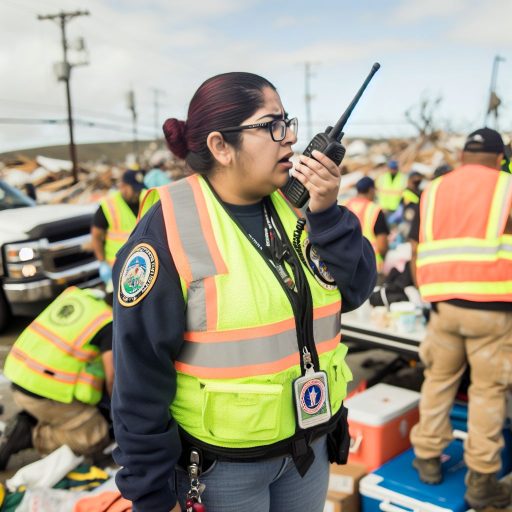DEA (Drug Enforcement Administration): Combating Drug Trafficking
The Drug Enforcement Administration (DEA) is a Federal agency responsible for enforcing the controlled substances laws and regulations of the United States.
It plays a crucial role in combating drug trafficking by investigating and enforcing drug-related crimes.
The Importance of Informants
Informants are vital assets for the DEA in gathering intelligence and evidence to support their operations against drug trafficking organizations.
These individuals have firsthand knowledge of criminal activities and can provide valuable information to law enforcement.
The Role of Informants in DEA Operations:
- Definition of informants and their significance in undercover operations.
- Explanation of how informants help gather crucial information to build cases against drug traffickers.
Informants play a crucial role in the operations of the Drug Enforcement Administration (DEA).
They are individuals who provide valuable information to law enforcement agencies, particularly in undercover operations where obtaining insider information is essential.
Informants are essential assets for building cases against drug traffickers and bringing them to justice.
Informants are often individuals who have insider knowledge of criminal activities, such as drug trafficking networks.
They may be former associates of drug dealers, individuals close to them, or even individuals who have been directly involved in criminal activities.
Informants play a pivotal role in gathering intelligence that can lead to the dismantling of drug trafficking organizations.
DEA agents rely on informants to gather crucial information that is often not accessible through traditional investigative methods.
Informants can provide details about drug trafficking routes, suppliers, distribution networks, and key players in the illegal drug trade.
This information is invaluable in building solid cases against drug traffickers and disrupting their operations.
Informants help DEA agents gather evidence that can be used to secure convictions in court.
They may provide tips about upcoming drug shipments, locations of drug labs, and other critical information that can lead to successful raids and arrests.
Informants are often key witnesses in criminal cases, providing firsthand accounts of illegal activities that can be crucial in securing convictions.
Benefits of Collaborating with Informants:
- Enhanced intelligence gathering capabilities.
- Increased success rate in apprehending drug traffickers.
- Disruption of drug trafficking networks.
- Improved coordination and effectiveness in undercover operations.
Collaborating with informants provides DEA agents with enhanced intelligence gathering capabilities, allowing them to penetrate deeply into drug trafficking networks.
Informants can provide real-time information about ongoing criminal activities, enabling law enforcement to stay one step ahead of drug traffickers.
This proactive approach is essential in disrupting drug trafficking operations and preventing the distribution of illegal drugs.
Working with informants also increases the success rate in apprehending drug traffickers.
Transform Your Career Today
Unlock a personalized career strategy that drives real results. Get tailored advice and a roadmap designed just for you.
Start NowInformants can provide crucial information that leads to the identification and arrest of key players in drug trafficking organizations.
By leveraging the insights and intelligence provided by informants, DEA agents can make targeted arrests that have a significant impact on the overall drug trade.
Collaborating with informants allows the DEA to disrupt drug trafficking networks at their core.
By targeting the leaders and key members of drug trafficking organizations, law enforcement can dismantle the infrastructure that supports the illegal drug trade.
This disruption not only leads to immediate arrests but also creates long-term challenges for drug traffickers in rebuilding their criminal enterprises.
Working with informants enhances the coordination and effectiveness of undercover operations conducted by the DEA.
Informants can act as liaisons between law enforcement and criminal organizations, providing critical information that helps infiltrate illegal activities.
By leveraging the insights and connections of informants, DEA agents can conduct successful undercover operations that result in the apprehension of drug traffickers and the seizure of illegal drugs.
Challenges and Considerations in Collaborating with Informants:
- Risk of informant credibility and reliability.
- Potential legal issues and ethical considerations.
- Need for ongoing support and protection for informants.
- Balancing the use of informants with other investigative methods.
While collaborating with informants offers numerous benefits, it also comes with challenges and considerations that DEA agents must carefully navigate.
One of the primary concerns is the risk of informant credibility and reliability.
Informants may provide inaccurate information, withhold crucial details, or have their own agendas that could compromise investigations.
DEA agents must also consider potential legal issues and ethical considerations when working with informants.
The use of informants in law enforcement operations raises questions about entrapment, confidential informants’ rights, and the legality of certain investigative techniques.
Agents must ensure that their collaboration with informants complies with legal guidelines and ethical standards.
Providing ongoing support and protection for informants is essential to maintain their cooperation and safety.
Informants often put themselves at risk by providing information to law enforcement, and they may face retaliation from criminal organizations.
DEA agents must ensure that informants are adequately supported and protected throughout their collaboration to maintain their trust and collaboration.
DEA agents must also balance the use of informants with other investigative methods to ensure comprehensive and effective law enforcement operations.
While informants are valuable sources of intelligence, agents must supplement their information with evidence obtained through traditional investigative techniques.
By balancing the use of informants with other methods, DEA agents can strengthen their cases against drug traffickers and ensure successful prosecutions.
Transform Your Career Today
Unlock a personalized career strategy that drives real results. Get tailored advice and a roadmap designed just for you.
Start NowRecruitment process for informants:
Identify potential informants through community connections.
Evaluate their credibility and reliability for intelligence gathering.
Approach informants discreetly to gauge their interest in collaborating.
Assess the informant’s motivation and incentives for providing information.
- Engage in community outreach programs to establish trust and rapport.
- Listen to rumors and insider information within the target population.
- Monitor criminal activities and identify individuals with insider knowledge.
- Utilize social networks and contacts to gather recommendations for informants.
Training and handling procedures for informants:
- Provide informants with guidelines on gathering information discreetly.
- Train informants in reporting procedures and document accuracy.
- Teach informants how to maintain confidentiality and protect their identity.
- Implement safety protocols in case informants are at risk of exposure.
Gain More Insights: Challenges Faced by K-9 Officers in the Line of Duty
Establishing trust with informants:
Building a strong relationship with informants is crucial for the success of DEA agents in their investigations.
Here are some strategies used by DEA agents to establish trust with informants:
- Regular communication: Agents maintain constant contact with informants to build a sense of trust and reliability.
- Show respect: Treating informants with respect and professionalism helps in creating a positive working relationship.
- Provide protection: Assuring informants of their safety and confidentiality is essential for gaining their trust.
- Offer incentives: Providing incentives or rewards to informants can motivate them to provide valuable information.
- Listen attentively: DEA agents listen carefully to informants’ concerns and show empathy towards their situation.
Importance of maintaining confidentiality and protecting the identity of informants:
Confidentiality is a cornerstone of informant collaboration for DEA agents.
Here is why it is vital to protect the identity of informants:
- Ensures informant safety: Keeping the identity of informants confidential protects them from potential harm or retaliation.
- Preserves credibility: Maintaining secrecy helps in preserving the credibility of informants and the information they provide.
- Enhances trust: Informants are more likely to cooperate if they trust that their identity will remain confidential.
- Legal obligations: DEA agents are bound by laws and regulations to safeguard the identity of informants.
- Long-term partnerships: Protecting informants’ identities fosters long-term relationships and continued collaboration.
Establishing trust with informants and maintaining their confidentiality are essential components of successful collaboration for DEA agents in their fight against drug trafficking and organized crime.
Explore Further: Private Investigators: Skills Beyond Surveillance
Handling sensitive information:
- Procedures for handling classified information provided by informants.
- Safeguards in place to prevent leaks and protect the integrity of investigations.
When it comes to collaborating with informants, one of the most critical aspects is handling sensitive information.
Informants often provide classified details that can make or break an investigation.
As a DEA agent, it is imperative to follow strict protocols when dealing with this type of information.
Procedures for handling classified information:
DEA agents are trained to handle classified information with the utmost care and discretion.
Upon receiving information from informants, agents follow specific procedures to ensure the security of the data.
- Encrypting electronic communication containing sensitive information.
- Limiting access to classified documents to only authorized personnel.
- Keeping physical copies of classified documents in secure locations.
- Using code words or pseudonyms to protect the identity of informants.
These procedures are in place to prevent unauthorized access to classified information and maintain the integrity of investigations.
By following these protocols, DEA agents can ensure that informants’ identities are protected and that crucial details remain confidential.
Safeguards in place to prevent leaks and protect the integrity of investigations:
In addition to following strict procedures for handling classified information, the DEA has safeguards in place to prevent leaks and protect the integrity of investigations.
- Conducting regular security audits to identify any weaknesses in information handling.
- Training agents on cybersecurity best practices to prevent data breaches.
- Implementing strong encryption protocols for all communication channels.
- Monitoring access to classified information to detect any suspicious activities.
By implementing these safeguards, the DEA can maintain the confidentiality of information provided by informants and ensure that investigations are not compromised.
Transform Your Career Today
Unlock a personalized career strategy that drives real results. Get tailored advice and a roadmap designed just for you.
Start NowCollaboration with informants is a valuable tool in fighting drug trafficking and criminal activities, and by handling sensitive information effectively, DEA agents can maximize the impact of their efforts.
Explore Further: Collaboration Between School Resource Officers and Staff

Informants play a crucial role in undercover operations carried out by the Drug Enforcement Administration (DEA).
They provide valuable information that helps agents bust drug rings, apprehend high-level drug traffickers, and dismantle criminal organizations.
Examples of successful operations where informants played a key role:
- In a recent operation, informants helped DEA agents identify a major drug trafficking network operating across state lines.
- Informants provided key information on the location of drug stashes, routes used by traffickers, and the identities of key players within the organization.
- Thanks to the collaboration with informants, DEA agents were able to conduct successful raids, seize large quantities of drugs, and make multiple arrests.
Challenges faced by DEA agents when working with informants and how they are overcome:
- Building trust: Building trust with informants is crucial but challenging. DEA agents must establish a strong rapport with informants to ensure the reliability of the information provided.
- Managing risk: Working with informants can be risky, as they are often involved in criminal activities. DEA agents must constantly assess and manage the risks associated with informant collaboration.
- Protecting identities: Keeping the identities of informants confidential is essential to their safety. DEA agents use code names and other security measures to protect the identities of informants.
- Maintaining communication: Effective communication is key to successful collaboration with informants. DEA agents must maintain regular contact with informants to gather timely and accurate information.
- Providing support: Informants may face threats or intimidation from criminal organizations. DEA agents provide support and protection to informants to ensure their safety.
Collaborating with informants is a vital part of the DEA’s work in combating drug trafficking and organized crime.
By overcoming challenges and establishing strong partnerships with informants, DEA agents can effectively disrupt criminal operations and make significant arrests.
Explore Further: TSA Officer Career Path: Opportunities for Advancement
Ethics and Legal Considerations
Ethical Guidelines for Working with Informants and Maintaining Trust
DEA agents must ensure informants are treated with respect and their safety is a top priority.
Building trust with informants is crucial for obtaining valuable information and successful investigations.
Informants should be fully informed of the risks involved and their rights in the collaboration process.
Transparency and honesty are essential in all interactions with informants to maintain ethical standards.
DEA agents must follow established protocols for handling and compensating informants to avoid ethical breaches.
Legal Implications of Using Informants in DEA Operations and Ensuring Compliance with Regulations
Informant recruitment and management must adhere to strict legal guidelines to protect both informants and DEA agents.
Using informants in undercover operations requires careful documentation and oversight to avoid entrapment issues.
Informant information must be verified and corroborated to ensure it meets legal standards for admissibility in court.
DEA agents must maintain accurate records of informant interactions to demonstrate compliance with legal requirements.
Regular training on legal procedures related to informant collaboration is essential for DEA agents to stay up-to-date with regulations.
Collaborating with informants is a crucial aspect of DEA operations, but it comes with significant responsibilities.
Transform Your Career Today
Unlock a personalized career strategy that drives real results. Get tailored advice and a roadmap designed just for you.
Start NowBy following ethical guidelines and legal protocols, DEA agents can effectively leverage informants to combat drug trafficking and uphold the rule of law.
Recap of the importance of informants in DEA operations.
Emphasis on the critical role informants play in combatting drug trafficking and keeping communities safe.
Additional Resources
I’m honored to start a new position as the Acting Administrator of the …




